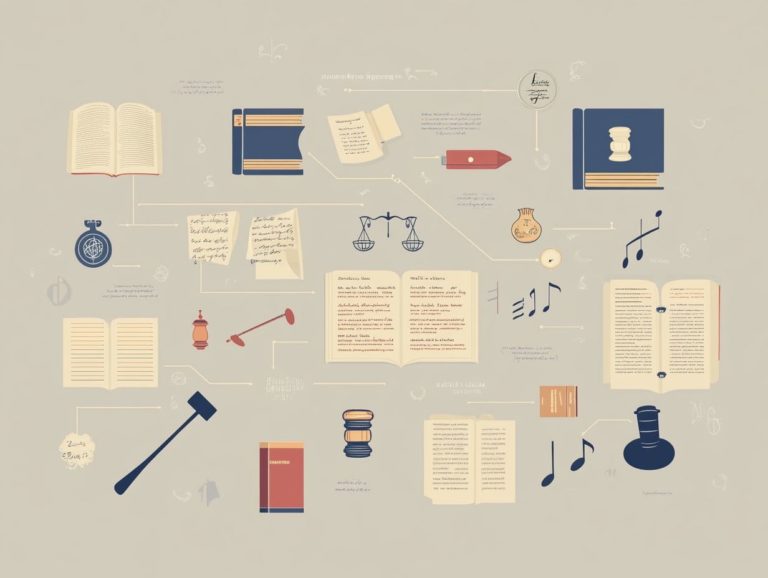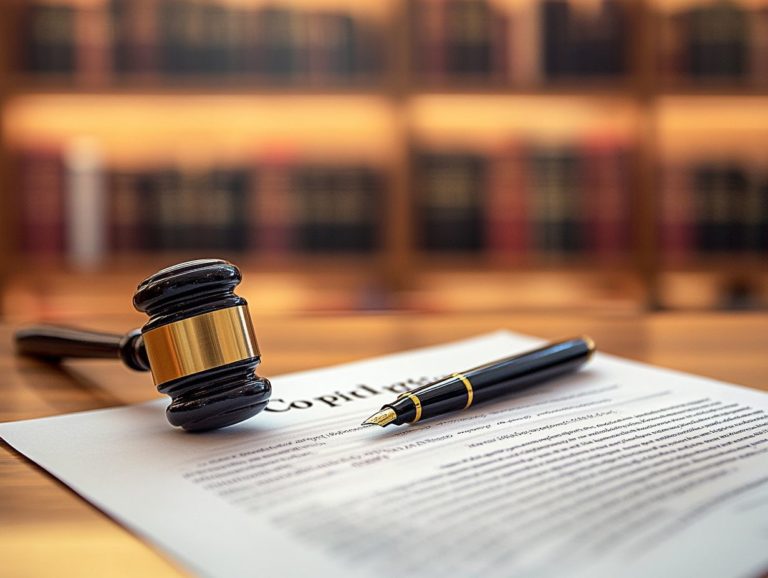The Role of Copyright in Business Branding
In today’s competitive market, understanding copyright is important for you, a business owner, looking to build and safeguard your brand.
This article explores copyright, defining it as a legal protection for original works like artistic creations, literature, and music while highlighting its essential role in protecting your brand’s identity and reputation.
You will learn about different types of copyright infringement and their consequences, as well as receive guidance on utilizing copyrighted material effectively in your branding strategies.
Uncover best practices for creating original content and ensuring that your intellectual property remains secure.
Use this knowledge to boost your brand now!
Contents
- Key Takeaways:
- The Importance of Copyright for Businesses
- The Importance of Copyright for Businesses
- Copyright Infringement: What Businesses Need to Know
- Using Copyrighted Material in Business Branding
- Best Practices for Businesses to Protect Copyright
- Frequently Asked Questions
- What is the role of copyright in business branding?
- How does copyright protect my company’s brand?
- Do I need to register my copyright for it to be valid?
- Can copyright protection be used for business branding internationally?
- What happens if someone infringes on my company’s copyrighted branding materials?
- Are there any exceptions to copyright protection in business branding?
Key Takeaways:

- Copyright protects your brand’s identity and reputation.
- Obtain licenses for copyrighted materials.
- Create original content to secure your intellectual property.
The Importance of Copyright for Businesses
Understanding copyright in business branding is crucial if you’re running a small or medium enterprise (SME) and looking to create a unique brand identity while safeguarding your intellectual property, especially considering the role of copyright in the fashion industry.
Copyright acts as a legal shield for your original works, ensuring you can maintain your competitive edge and consumer loyalty.
By leveraging copyright in digital content effectively, you can craft a strong business strategy that enhances your brand recognition and equity, ultimately fueling sustained growth for your enterprise.
Defining Copyright and Its Purpose
Copyright serves as a vital form of legal protection, ensuring you maintain exclusive rights over how your original works are used and reproduced.
This law helps you protect your intellectual property and cultivates an environment where innovation can flourish.
It encompasses various creations, including novels, films, songs, paintings, software, and architectural designs.
Consider a bestselling novel or a chart-topping song; copyright protection is essential to prevent unauthorized reproductions that could diminish your potential earnings.
A clear ownership framework helps you invest time and resources into your projects, confident that your work can be monetized and your rights protected.
This commitment contributes to the integrity of the brands that emerge from your creative expressions.
The Importance of Copyright for Businesses
The significance of copyright for businesses is paramount, serving as a cornerstone for establishing a robust brand identity while ensuring compliance with legal standards. Understanding the role of trademarks in brand identity is crucial in today’s fiercely competitive marketplace.
Without it, your brand’s uniqueness could be compromised, making it essential to prioritize copyright protection to safeguard your creative assets.
Protecting Brand Identity and Reputation
Protecting your brand identity and reputation through copyright is essential for maintaining your competitive edge and earning consumer trust.
You can achieve this by implementing strategic measures, such as registering trademarks and copyrights, which act as legal shields against unauthorized use.
By properly registering your unique logos, slogans, and creative works, you deter potential infringements. A strong trademark not only safeguards your brand elements but also enhances recall and differentiation in the marketplace.
This differentiation is vital for building a loyal customer base, reinforcing your brand’s unique value proposition. Ultimately, a well-protected brand identity fosters positive consumer perceptions, significantly bolstering your business’s overall reputation.
Ensuring Legal Compliance

Ensuring legal compliance with copyright and intellectual property rights is crucial to avoid trademark infringement and unfair competition. This understanding safeguards your assets and nurtures innovation by promoting a fair playing field for everyone in the market.
Ignoring these laws can lead to serious financial consequences. You may face hefty fines or lawsuits that escalate quickly.
If you use logos and branding that closely resemble those of a competitor, you could find yourself in a legal mess. This situation can tarnish your reputation and credibility.
To protect yourself from such predicaments, it’s essential to educate your team about intellectual property, seek reliable legal counsel, and implement effective trademark registration strategies. This way, you can maintain your unique identity while respecting the rights of others.
Copyright Infringement: What Businesses Need to Know
Copyright infringement occurs when you use copyrighted material without permission. This can jeopardize your business and put you at legal risk.
Types of Copyright Infringement
Be aware that various forms of copyright infringement exist, including direct copying, unauthorized distribution, and derivative works all of which can lead to significant legal ramifications for your business.
Creators and organizations often face challenges beyond blatant replication. Subtler forms of misuse, such as using images or text without proper licensing, can also pose risks.
Unauthorized distribution frequently happens when digital media is shared on peer-to-peer networks or social media platforms without consent. Derivative works, which include adaptations or versions that take a lot from the original work, can lead to disputes as they may undermine the original creator’s rights.
Trademark infringement introduces its own set of hurdles. Companies often find their brand integrity compromised, prompting them to take proactive steps. This includes conducting thorough trademark searches and maintaining vigilant brand monitoring to protect their identities in a competitive landscape.
Consequences and Remedies
The consequences of copyright infringement can be severe, including legal damages, loss of revenue, and detrimental effects on your business growth and reputation.
Such repercussions can dissuade potential clients and partners, leading to a noticeable decline in trust and credibility within your industry. Costly lawsuits can drain your resources and distract you from what matters most.
Act now to reduce these risks! Here are some effective steps to take: engaging in proactive measures like negotiating licenses can help ensure you remain legally compliant while continuing to produce creative work.
Alternatively, seeking legal action to defend against claims can be a viable strategy. Understanding your rights and provisions under copyright law is crucial.
Using Copyrighted Material in Business Branding
When incorporating copyrighted material into your business branding, it s essential to secure the necessary permissions and licenses. This not only ensures compliance with copyright laws but also helps you steer clear of potential infringement issues.
Prioritizing these legal safeguards will protect your brand’s integrity and reputation.
Take charge of your brand today. Understand your rights and protect your creative work!
Obtaining Proper Permissions and Licenses

Obtaining the proper permissions and licenses is essential if you want to incorporate copyrighted material into your branding strategies while ensuring strong copyright protection.
This process shields your brand from potential legal disputes and fosters creativity and respect for creative work.
By skillfully navigating the complexities of licensing, you can unlock many opportunities, including collaborations with artists and content creators that elevate your market presence.
Understanding these rights is crucial for leveraging existing works and crafting innovative campaigns. A well-structured licensing strategy significantly contributes to your brand development, helping you expand your reach and establish a reputable identity in your industry.
Fair Use and Transformative Use
Fair use and transformative use are essential concepts in copyright law that allow you to use copyrighted material without seeking permission, provided you meet specific conditions.
These principles balance the rights of creators with the public’s interest in the free flow of ideas and information.
Fair use typically applies when engaging with a copyrighted work for purposes like criticism, commentary, news reporting, teaching, scholarship, or research.
Transformative use comes into play when you alter a work, infusing it with new expression or meaning, distinguishing it from the original.
By harnessing these concepts, you can craft unique branding strategies like using elements of popular culture in your advertisements or social media campaigns as long as you meet the criteria for transformative use.
Grasping and implementing these ideas effectively allows you to engage your audience creatively while respecting copyright laws, ultimately giving your business a competitive edge in the marketplace.
Best Practices for Businesses to Protect Copyright
Embrace best practices for copyright protection now to safeguard your creative works and secure your brand identity in today s competitive landscape.
By prioritizing these measures, you not only shield your creative work but also enhance your standing in the marketplace.
Creating Original Content
Creating original content is essential for any business aiming to bolster its copyright protection while promoting innovation and a distinctive brand image.
By putting originality at the forefront, you safeguard your creative work and pave the way for stronger legal protections.
This commitment sets you apart in a crowded marketplace and fosters a culture of creativity within your team.
Encouraging your team to brainstorm and explore new ideas can yield unique concepts that resonate with your target audience.
Implementing regular workshops and fostering collaboration can ignite innovative thinking across the board.
As a result, cultivating such an environment significantly enhances your brand equity, making your business more recognizable and appealing to consumers globally.
Monitoring and Enforcing Copyright
Monitoring and enforcing copyright is crucial for identifying potential infringements and taking necessary steps to safeguard your legal rights.
Adopting robust tracking methods, like digital fingerprinting and web scraping tools, allows you to scan the online landscape for unauthorized use of your creative work.
This proactive approach protects your assets and preserves your brand’s integrity while building customer trust.
Unchecked copyright infringement can diminish revenue and weaken your market position. Therefore, having a systematic strategy is vital.
This strategy allows for prompt responses to infringement and cultivates a culture of respect for creative work.
Over time, consistent and effective enforcement drives business growth, enabling you to invest confidently in innovation, secure in the knowledge that your creations will be well-protected.
Frequently Asked Questions

Start protecting your creative work today to secure your brand’s future!
What is the role of copyright in business branding?
Copyright shields your original creations like logos and slogans from being copied or misused. This protection is vital for maintaining your unique business identity.
How does copyright protect my company’s brand?
Copyright gives legal protection to your logos, designs, and written content. This means others can’t use these elements without your permission, keeping your brand intact.
Do I need to register my copyright for it to be valid?
No worries! Copyright protection kicks in automatically when you create something original. But registering it can give you extra legal benefits, making it easier to enforce your rights if someone infringes.
Can copyright protection be used for business branding internationally?
Yes! Copyright protection is recognized in many countries through international treaties. Just be sure to check each country’s copyright laws and registration requirements.
What happens if someone infringes on my company’s copyrighted branding materials?
If someone uses your materials without permission, you can take action to protect yourself. This could include sending a cease and desist letter or even filing a lawsuit.
Are there any exceptions to copyright protection in business branding?
Yes, there are limited exceptions, like “fair use.” This allows for the use of copyrighted materials for things like criticism or education. Always consult a legal professional to understand these exceptions better.






